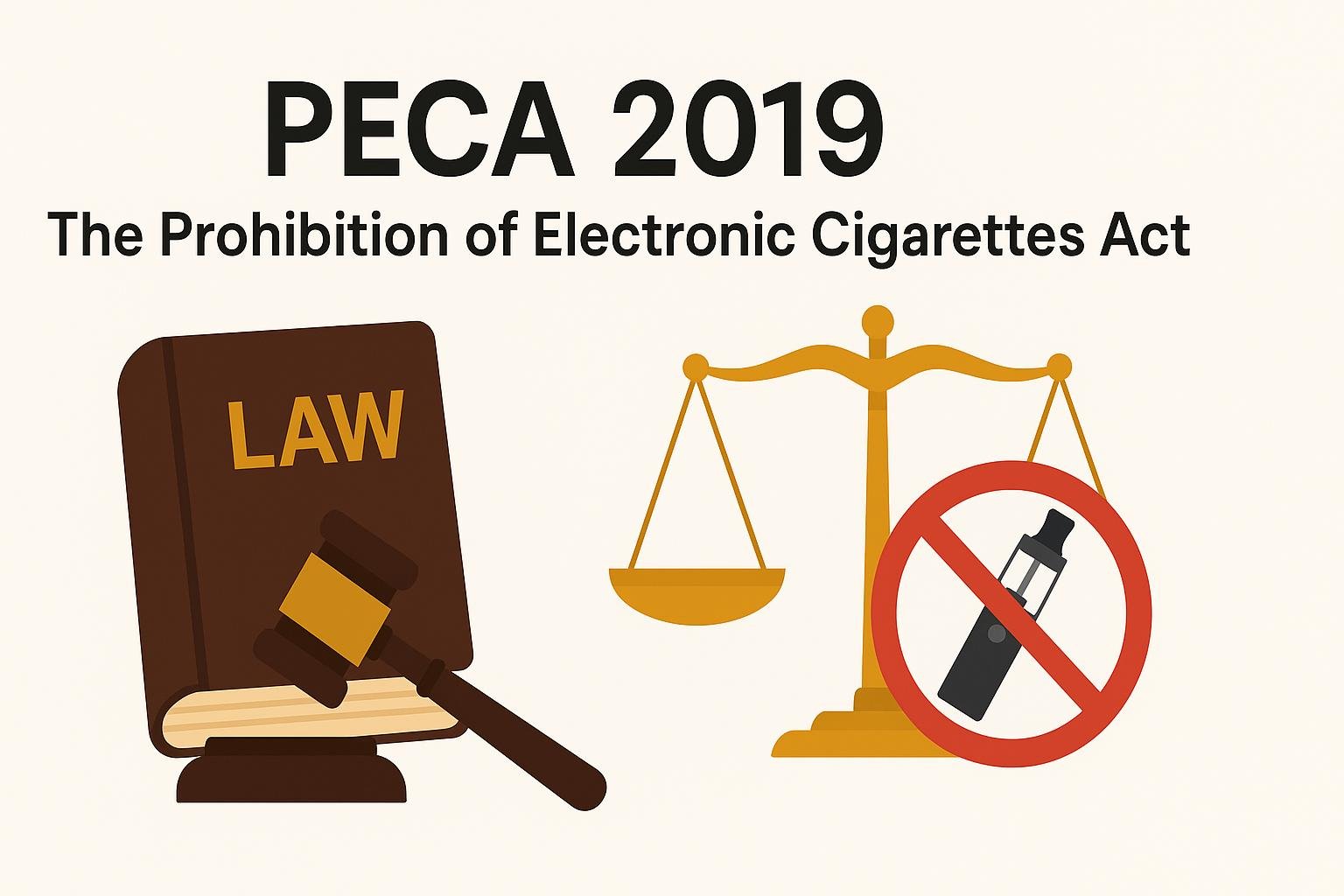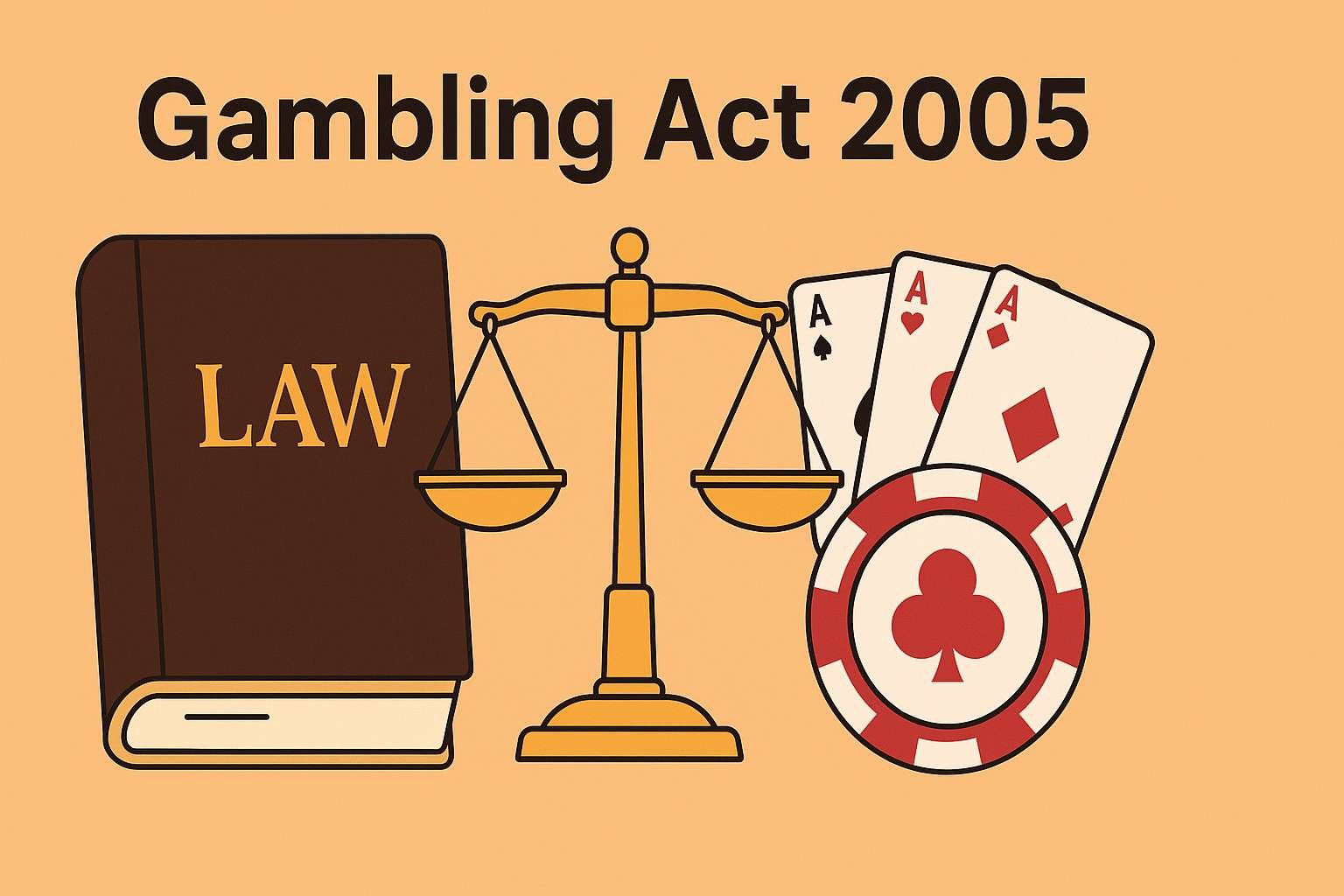On this page you will read detailed information about PECA 2019
PECA stands for The Prohibition of Electronic Cigarettes (Production, Manufacture, Import, Export, Transport, Sale, Distribution, Storage and Advertisement) Act, 2019.
In other words, PECA is the law by which India has banned a wide range of activities connected to e-cigarettes (vapes, heat-not-burn devices, e-liquids, and related equipment). It aims to regulate the emerging electronic nicotine delivery systems (ENDS) and to protect public health.
The Act was passed on 5 December 2019 and is treated as having effect from 18 September 2019 (when the earlier ordinance became operative)
Why Was PECA Introduced?
Public health concerns & youth protection
- Rising use of e-cigarettes / vaping: Even though India’s prevalence was relatively low, there was a fear that the trend would grow rapidly, especially among youth.
- Unknown long-term risks: Scientific evidence was limited about the long-term health effects of vaping. The government adopted a precautionary principle approach.
- Prevent nicotine addiction escalation: E-cigarettes (especially flavored versions) have the potential to serve as a gateway to nicotine use among non-smokers.
- Global trend: Some countries were regulating or banning e-cigarettes. India followed with a stricter path.
Hence, the law aims to curb all supply, distribution and promotional channels for e-cigarettes.
Key Provisions of PECA 2019
Below are the major features and sections of PECA:
1. Prohibition of manufacturing, import, sale, transport, display & advertisement
PECA prohibits a wide array of activities involving e-cigarettes or their components (devices, e-liquids, etc.): production, import, export, transport, sale, distribution, and advertisement.
This includes online sales and cross-border shipments.
2. Ban on storage of stocks
Even storing e-cigarette products is prohibited — entities cannot hold inventory or stock for sale or distribution.
Violating storage rules is punishable under a separate section.
3. Powers of search, seizure, and disposal
Authorized officers (police or other designated officials) can enter, search, seize premises, devices, stock or related records without warrant, when they believe an offence is being committed.
Once seized, stocks may be disposed of per rules.
4. Penalties / punishment
- For contravention of prohibition (sale, import, etc.): On first offence, imprisonment up to 1 year or fine up to ₹1 lakh, or both. On subsequent offences, up to 3 years imprisonment and fine up to ₹5 lakh.
- For storage offences: Penalty up to 6 months imprisonment or fine up to ₹50,000, or both.
- The Act provides that offences are cognizable (police can register FIR) and non-bailable or subject to stringent court decisions, depending on severity.
5. Corporate liability
If a company is found in violation, each officer who is responsible may be held liable unless they can prove lack of knowledge or due diligence.
6. Act overrides other laws
PECA is intended to override inconsistent provisions of other laws to the extent of conflict.
7. Implementation and powers to remove difficulties
The government may issue rules or orders for implementation, and address constitutional or practical challenges.
Scope, Clarifications & Controversies
Is use or possession explicitly banned?
The Act does not explicitly mention “personal use” or “possession” in its main prohibition clauses.
However, various statements and media sources indicate that possession is considered illegal in practice under PECA. For example, the Health Ministry has stated that possession of e-cigarettes violates PECA.
Some legal critiques argue that the law’s silence leads to ambiguity around enforcement against mere users.
Online sales & digital platforms
Because PECA prohibits sales and distribution, it applies to online commerce and cross-border e-commerce. Several studies point out that Indian stores and platforms selling e-cigarettes (national or international) risk liabilities under Section 7 (sale/distribution) even for online business.
Enforcement gaps & illicit market
- Even after the law, illegal supply chains persist. A 2023 study found that ~10% of young adults reported using e-cigarettes, obtaining them via retail or social networks.
- Authorities conduct raids and seize stocks across cities — for example, in Nagpur recently, where 97 e-cigarettes and related items were seized under PECA.
- Enforcement is inconsistent and constrained by resource, awareness, and the ease of concealing devices.
Constitutional / legal scrutiny
Legal scholars have questioned whether the law intrudes on personal choice / privacy rights (Article 21). Some argue proportionality and rational nexus tests may not be fully satisfied.
Also, critics say the legislation may limit a harm-reduction tool (vaping as substitute to smoking) and thereby restrict choices.
Implementation and Recent Developments
State enforcement & expert committees
- Implementation responsibility lies with states and union territories, supervised by central guidelines.
- An expert committee monitors online complaints and violations.
- The Act has overriding effect over conflicting provisions in other laws.
Real-world seizures & crackdowns
- In Nagpur, police raids seized large quantities of e-cigarettes and booked offenders under PECA.
- In Mangaluru, devices and stocks worth ~₹9.7 lakh were seized under the Act and other tobacco laws.
- In Surat, a tattoo artist was arrested for possessing e-cigarettes worth over ₹1.07 crore under PECA.
These cases show that authorities are actively using PECA’s enforcement powers.
Strengths & Weaknesses of PECA
Strengths
- Comprehensive ban on trade chain: manufacturing to advertisement is outlawed.
- Powerful enforcement tools: search, seizure, disposal authority, cognizable offences.
- Overrides other conflicting laws, ensuring supremacy in its domain.
- Public health orientation: forward-looking policy to curb nicotine initiation.
Weaknesses / Challenges
- Ambiguity on possession: users may get caught in gray area.
- Enforcement constraints: resource limitations, clandestine trade, online channels.
- Possible overreach: critics argue lack of nuance between casual user and large scale vendor.
- Harm reduction tradeoffs: total ban removes potential alternative to combustible cigarettes.
- Judicial scrutiny: challenges on constitutional rights and proportionality may arise.
In the previous post, we had shared information about Navigating the POSH Act: Your Guide to Workplace Compliance, so read that post also.
What Does PECA Mean for Users & Stakeholders?
For users and potential buyers
- Buying, selling, importing, or distributing e-cigarette devices or components is illegal.
- If you hold or possess a vape device, enforcement agencies might treat it as contravention (based on practice).
- Attempting to carry a vape into India (for instance during travel) may lead to confiscation and legal trouble.
For online vendors / websites / influencers
- Online platforms selling vapes or promoting them are exposed to liability under PECA (especially Section 7).
- Influencers or social media accounts that indirectly promote vaping may also face penalties under advertising prohibition.
For public health policy & government
- PECA demonstrates India’s strict and proactive approach toward nicotine risk control.
- But enforcement must be strengthened, digital surveillance improved, awareness raised at grassroots.
- Periodic review of implementation, and possible regulation for cessation tools (nicotine replacement therapy) is needed.
Conclusion
The Prohibition of Electronic Cigarettes Act, 2019 (PECA) is a landmark law in India’s fight against emerging nicotine threats. It bans manufacture, import, sale, distribution, storage, transport, and advertisement of e-cigarettes and related devices.
While the law is robust in intent and scope, its practical enforcement faces challenges: illicit trade, online sales, and legal ambiguity over possession. Moreover, whether the ban fully aligns with constitutional limits (such as personal choice) is a subject of scholarly debate.
From a policy perspective, the success of PECA will depend on vigilant implementation, technology‐based monitoring, legal clarity, and balancing public health goals with individual rights.
Disclaimer
The information and services on this website are not intended to and shall not be used as legal advice. You should consult a Legal Professional for any legal or solicited advice. While we have good faith and our own independent research to every information listed on the website and do our best to ensure that the data provided is accurate. However, we do not guarantee the information provided is accurate and make no representation or warranty of any kind, express or implied, regarding the accuracy, adequacy, validity, reliability, availability, or completeness of any information on the Site. UNDER NO CIRCUMSTANCES SHALL WE HAVE ANY LIABILITY TO YOU FOR ANY LOSS OR DAMAGE OF ANY KIND INCURRED AS A RESULT OR RELIANCE ON ANY INFORMATION PROVIDED ON THE SITE. YOUR USE OF THE SITE AND YOUR RELIANCE ON ANY INFORMATION ON THE SITE IS SOLELY AT YOUR OWN RISK. Comments on this website are the sole responsibility of their writers so the accuracy, completeness, veracity, honesty, factuality and politeness of comments are not guaranteed.
So friends, today we talked about PECA 2019, hope you liked our post.
If you liked the information about PECA 2019, then definitely share this article with your friends.
Knowing about laws can make you feel super smart ! If you find value in the content you may consider joining our not for profit Legal Community ! You can ask unlimited questions on WhatsApp and get answers. You can DM or send your name & number to 8208309918 on WhatsApp








